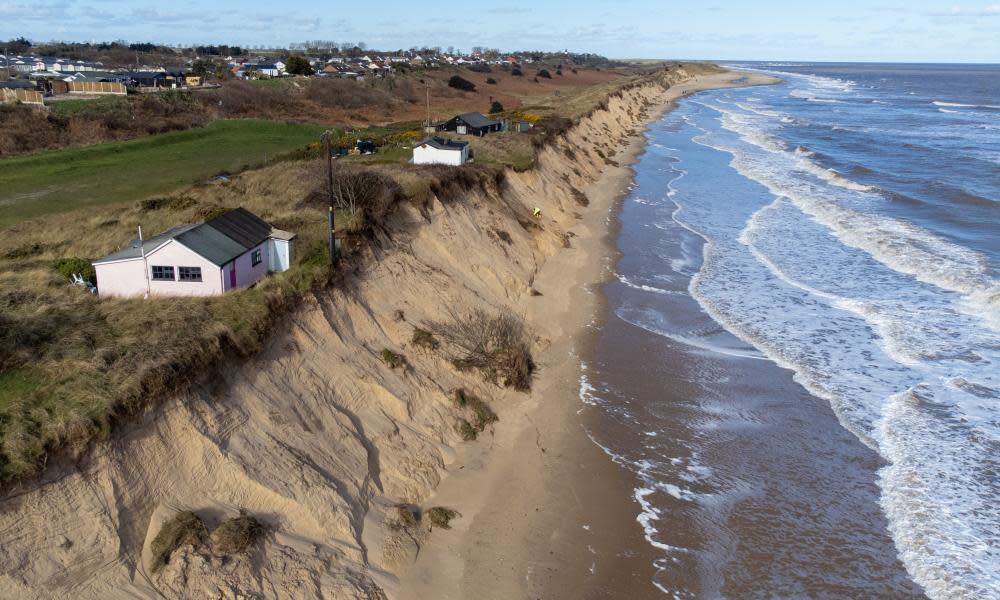Claimants take UK government to court over inadequate climate adaptation

When Kevin Jordan bought his seaside home in Hemsby, Norfolk, he was told it would be safe for a century. In the decade since, 17 of his neighbours’ homes have had to be demolished, or have been swept away into the waters of the North Sea. His is now just 5 metres from the fast-crumbling cliff, isolated and unreachable by car after part of the road collapsed into the North Sea.
The people of Hemsby would seem to be natural beneficiaries of official policies to adapt to the climate crisis. Under the Climate Change Act 2008, the government is required to produce a national adaptation programme every five years, setting out plans protect communities in the UK from the extreme heat, flooding and coastal erosion expected as the climate breaks down.
But critics, including the government’s own advisers, the Climate Change Committee (CCC), have said it is not doing enough. And now, in a case believed to be the first of its kind, Jordan is taking the government to court, alleging its failure to set out lawful “adaptation objectives” in its latest plan is a breach of his human rights.
“The collapse of the road made so many more things a struggle,” Jordan said. “From emergency services to bin collections, grocery shopping and even the post, it’s been one thing after another. It feels like we’re being forgotten up here.”
In a care home 200 miles away, in Wetherby, West Yorkshire, lives Doug Paulley, a co-claimant in the case. He lives with a number of long-term conditions that make him particularly susceptible to overheating, including autonomic dysfunction, which has contributed to several strokes, as well as diabetes and a heart condition.
“During last year’s heatwaves in the UK, I practically had to hibernate to get through it, and couldn’t venture outside,” said Paulley. According to the Health Security Agency 2,803 excess deaths occurred during the summer of 2022. Those with medical conditions, older people and very young children were especially at risk.
But the adaptation plan fails to set out a cross-sector approach to addressing heat-related risks to the social care sector, nor does it provide dedicated long-term funding to retrofit care homes with insulation and cooling measures.
“Even when temperatures are in the minuses, I’m most comfortable wearing just a T-shirt and trousers – that should give an idea of how much I struggle with heat intolerance,” he said. “With the world only getting hotter, it’s becoming increasingly difficult for someone with my complex health needs to cope.”
The latest national adaptation programme (NAP3) was published in July, four months after the CCC warned MPs in a report to parliament that its predecessor plan, NAP2, included credible plans for only five of the 45 adaptation areas.
Jordan and Paulley’s legal challenge, supported by Friends of the Earth, argues that NAP3 continues to fall short. They say it breaches the Climate Change Act by failing to set out lawful “adaptation objectives”, and by failing to consider and publish an assessment of the risks to delivery of the plans and policies included.
In a case that is believed to be the first to challenge UK climate adaptation plans, they also ask the court to rule that the deficiencies in the national plan breach Jordan and Paulley’s human rights by failing to protect their lives, homes and property from foreseeable impacts of the climate crisis.
Friends of the Earth also believes that the Department for Environment, Farming and Rural Affairs (Defra) failed to lawfully assess the unequal impacts of the NAP3 on protected groups under the Equality Act 2010, in line with the “public sector equality duty”.
The claimants have already written to the environment secretary, Thérèse Coffey, to raise their concerns. But her department denied any wrongdoing and refused to disclose key documents. On 17 October, the claimants filed their case at the high court.
Will Rundle, the head of legal at Friends of the Earth, said: “This year has set a string of new global temperature records which have driven deadly heatwaves and wildfires across the world, and last July the UK exceeded 40C for the first time ever.
“We need our government to take urgent action to curb emissions and put in place credible plans to keep us safe from the extreme weather and impacts of climate change already devastating people’s lives. But the government’s latest adaptation plan continues to fall far short of what’s needed – and comes amid backtracking on the green policies needed to tackle climate change.
“Our co-claimants are among those most at risk from the climate crisis. We hope this case will lead to more ambitious and effective adaptation plans that better protect everyone, especially those who are already being hardest hit by climate breakdown.”
The Guardian has contacted Defra for comment.


